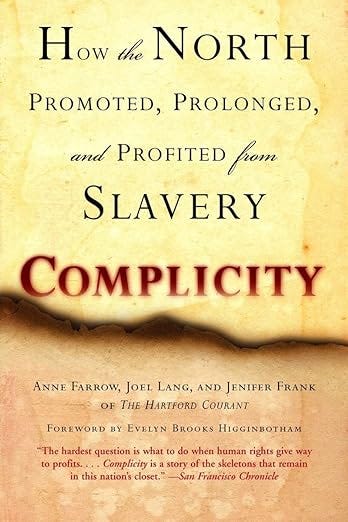Friday Faves & Feels, #1
Book Recommendation: "Complicity: How the North Promoted, Prolonged, and Profited from Slavery"
A Happy Friday to you!
Welcome to a new offering of The Unfiltered Scribe, Friday Faves & Feels.
Each week I will send you a short post of something I’ve appreciated and want to share with you.
February is Black History Month. There is a tendency for us to equate black history with slavery. For sure, it’s a part of the story. But it should be noted that this month is about celebrating the countless contributions of our black brothers and sisters throughout the history of the United States.
I just wanted to point that out because I’m about to recommend a book about our history of chattel slavery.
The book, Complicity: How the North Promoted, Prolonged, and Profited from Slavery, was instrumental in helping me better understand some of the complexities involved in the subject.

I grew up and was educated in the Northeast. As a result of the history I received about the American Civil War, I developed a somewhat haughty attitude towards the South. Complicity helped me see that while the North was a driving force for abolition and supplied troops for the Union Army, it also benefitted greatly from the South’s use of forced human labor.
Two Examples of Things I Learned
In the early days of America, even in the years between the United States gaining independence from Britain and the Civil War, agriculture drove the northern economy. They made money by selling food to those who needed it. The people who needed it most were the sugar plantations in the Caribbean. They needed it to feed their population of enslaved people. The soil and/or climate there was good for growing sugar cane, but not so good for other food stuffs. The North was happy to take their money and provide the food to feed the enslaved people who were making plantation owners rich.
Lawrence and Lowell, Massachusetts1 grew into bustling cities due to the textile industry. It doesn’t take a genius to see where this is going… The cheapest source of the cotton necessary for making the textiles was, you guessed it, the slave-fields of the South. Also, one of the greatest consumers of the clothes made in the North were the plantation owners in the South who needed to clothe their enslaved people.
My Takeaways
The book helped me gain a better understanding of the nuance we often ignore in history. We want to be “on the right side” of history, whether that history already happened or of the history we’re living today.
So, it also left me wondering where I’m complicit today. For instance, it’s my understanding that the raw materials needed for the phone in my back pocket are hard to come by and are mined by people experiencing harsh conditions. Further, there are significant environmental concerns in regards to the raw materials for my iPhone. Am I complicit in these problems? There’s a chance my descendants will point at me the way I point at my Northern or Southern ancestors.
These are the things I think about.
Incidentally, or maybe not so incidentally, I grew up near both of these cities. My mother worked as a school teacher in Lawrence in the 1980’s and 1990’s. I attended church in Lowell, and most of my best friends lived there.



I haven't read the book, but I think one of the things I want to get away from is the generalization of *any* group of people. There were a lot of people in the South who saw the atrocities of slavery and tried to do something. And there were a lot of people in the North who didn't.
I just applied for a seminar weekend in April that will be a walking tour of Boston to visit places that participated in the slave trade, including churches. I'm hopeful I'm accepted. Dr. Nick Rowe is one of the seminar leaders. https://www.egc.org/rcci-experiential
I do remember going to the textile mills in Lowell for a 6th grade field trip that first taught me that many aspects of culture and business in the North had complicity in slavery.
That is a trip I’d like to be on. Dr. Rowe is a particularly skilled educator.
I’m glad to hear of your 6th grade trip. I think by the time I was taking history classes in high school my teachers began to offer a more complete picture of history in general. Or, perhaps my intellectual development was allowing me to hear those parts. Just a bit.